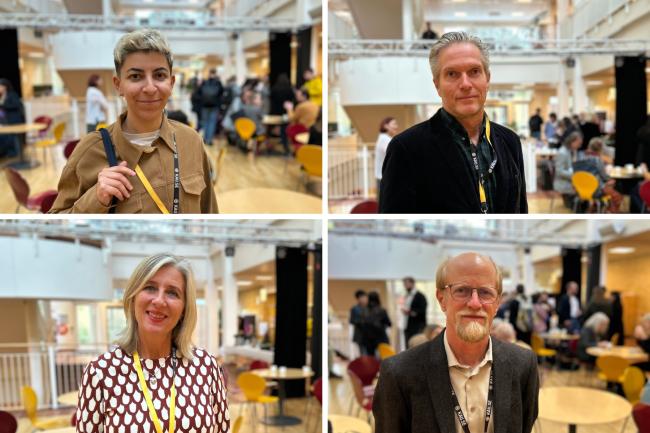Transforming Passions – The Geomedia Conference That Unites Research, Place, and Passion
2025-09-19During three intensive days in September, researchers from around the world gathered at Karlstad University to participate in the international geomedia conference Transforming Passions. This year marks the conference’s tenth anniversary, and interest in geomedia as a research field continues to grow.
– It’s fantastic to see how engaged and joyful everyone is, says Georgia Aitaki, Senior Lecturer in Media and Communications and Conference Director.
– We’re celebrating ten years, and it truly feels like a reunion. At the same time, we have many new faces here, which brings a sense of renewal.
The conference is more than an academic forum—it’s a space for exchanging ideas, building community, and finding inspiration. Film screenings, panel discussions, and parallel research sessions create a dynamic environment where passion for research takes center stage.
– The inspiration was to create a place where people feel passionate about their own research, about geomedia, about each other, and about the world we live in, says Georgia Aitaki.
Geomedia – From Idea to Established Field
André Jansson is the director of the Centre for Geomedia Studies and has led the research group since its inception in 2013.
– We’ve built a strong network and a sense of community that spans across disciplines. The network is constantly evolving and growing. It’s a dynamic field, and the conference is a way to nurture and consolidate our connections, says André Jansson.
– Geomedia is now both a research center and an established field. It’s interdisciplinary and open—if you’re interested, you’re welcome, whether you come from media and communication studies or from geography and spatial studies.
He looks forward to the field tackling new questions, especially around power relations, digitalization, and AI.
– It’s important to understand how technological developments, such as AI, affect people’s everyday lives, living conditions, and places, says André Jansson.
– What does it mean for the feeling of inclusion or exclusion? Do people want to be connected, or do they have the right to opt out? There’s a discourse around this—how we create places and environments that aren’t entirely saturated by digital media, or how our lives become fragmented. These kinds of questions are crucial—questions of power, but also of quality of life.
Global Perspectives and Local Relevance
Paul C. Adams, Professor at the University of Texas at Austin, is spending the entire month of September as a visiting researcher at Karlstad University and participated in the conference. He has been involved in the development of geomedia alongside André Jansson since the beginning.
– I published a book in 2009 called Geography of Media and Communication, where I tried to get geographers interested in media and communication as a general topic, says Paul C. Adams.
– A year later, I started collaborating with André Jansson, who was developing the idea of geomedia—which I believe is exactly the interface I wrote about: between geography and media and communication studies.
– We’ve gone from a situation where no one knew what geomedia was, to it now being an established field with shared interests among many researchers.
Future Directions – Personal Sovereignty in a Digital World
One key issue for Paul C. Adams is the relationship between digital media and sovereignty, with the EU’s GDPR as an example of efforts to protect personal data from uncontrolled international circulation and corporate exploitation. It’s about safeguarding individual privacy, autonomy, and resisting manipulation.
– But if you look at digital sovereignty in countries like Russia or China, it’s more about the state wanting to control its citizens, says Paul C. Adams.
– So sovereignty is a double-edged concept—it can both protect people and be used to control them. I find it particularly interesting to explore what happens to what I call personal sovereignty in a digital world, and what role the state plays in this.
Locally Anchored Research with Global Relevance
Anette Hill, Professor of Media and Communications at Jönköping University and Ander Visiting Professor in Geomedia, also participated in the conference. Her research within geomedia takes a more local perspective. One of her projects focuses on infrastructure development in Ydre Municipality, where one of Sweden’s largest hybrid facilities for fossil-free electricity is currently being built.
– There are tensions between the environmental values of the local population and the exploitation by global corporations, says Anette Hill.
– I’m exploring this from a local perspective, where people are highly environmentally conscious. It’s a very sparsely populated region, and at the same time, there’s significant exploitation with little discussion or protection of natural resources. I’m investigating how people in rural areas experience these changes, and how media and infrastructure affect their lives.
A Conference for Groundbreaking Research
– The Geomedia group conducts very interesting and groundbreaking research, where questions of place and geography are combined with questions about media and how we engage with it, says Anette Hill.
– It’s a network in a friendly and positive environment. The conference has created a unique space for discussion among people with interests ranging from geography to media and communication research—and that’s quite rare.
More about the conference


